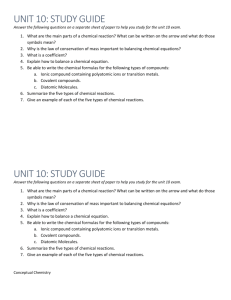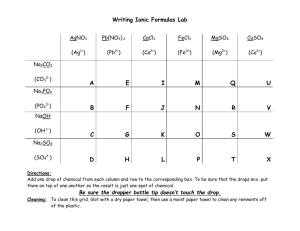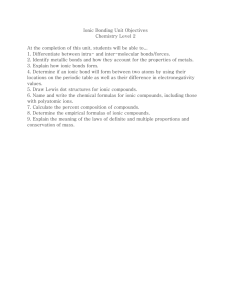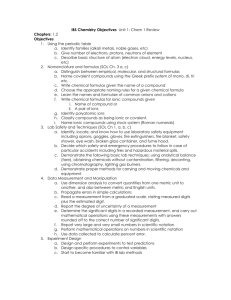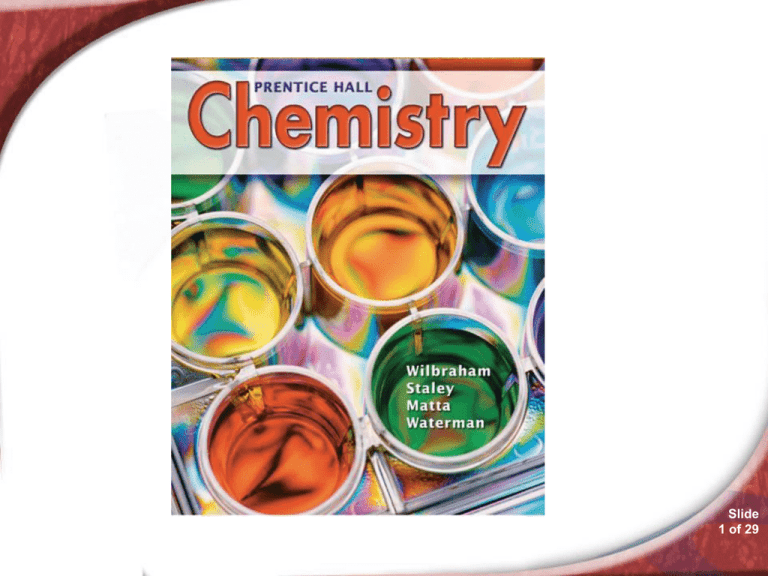
chemistry
Slide
1 of 29
9.2
Naming and Writing Formulas
for Ionic Compounds
A recipe is a formula for
the sauce—a complete list
of ingredients and their
proportions. Chemistry
also uses formulas. Once
you know the rules, you
can write the formula for
any chemical compound.
Slide
2 of 29
© Copyright Pearson Prentice Hall
9.2
Naming and Writing Formulas
for Ionic Compounds
>
Binary Ionic Compounds
Binary Ionic Compounds
How are the names of binary ionic
compounds determined?
How do you write the formulas for
binary ionic compounds?
Slide
3 of 29
© Copyright Pearson Prentice Hall
9.2
Naming and Writing Formulas
for Ionic Compounds
>
Binary Ionic Compounds
These masks are made of an ionic compound
with the common name gypsum. This name does
not tell you anything about the chemical
composition of the compound, though.
Slide
4 of 29
© Copyright Pearson Prentice Hall
9.2
Naming and Writing Formulas
for Ionic Compounds
>
Binary Ionic Compounds
Naming Binary Ionic Compounds
A binary compound is composed of two
elements and can be either ionic or molecular.
To name any binary ionic compound,
place the cation name first, followed by
the anion name.
Slide
5 of 29
© Copyright Pearson Prentice Hall
9.2
Naming and Writing Formulas
for Ionic Compounds
>
Binary Ionic Compounds
Tin(II) sulfide, or SnF2, is added to toothpastes to
prevent cavities.
Slide
6 of 29
© Copyright Pearson Prentice Hall
9.2
Naming and Writing Formulas
for Ionic Compounds
>
Binary Ionic Compounds
Tin(IV) sulfide, or SnS2, is used in glazes for
porcelain fixtures and dishes.
Slide
7 of 29
© Copyright Pearson Prentice Hall
9.2
Naming and Writing Formulas
for Ionic Compounds
>
Binary Ionic Compounds
Hematite, a common ore of iron, contains iron
(III) oxide. The balanced formula is Fe2O3.
Slide
8 of 29
© Copyright Pearson Prentice Hall
9.2
Naming and Writing Formulas
for Ionic Compounds
>
Binary Ionic Compounds
Writing Formulas for Binary Ionic Compounds
Write the symbol of the cation and then
the anion. Add whatever subscripts are
needed to balance the charges.
Slide
9 of 29
© Copyright Pearson Prentice Hall
Naming and Writing Formulas
for Ionic Compounds
>
Simulation 9
Simulation 9 Simulate combining ions and
deriving the chemical formulas for several
ionic compounds.
Slide
10 of 29
© Copyright Pearson Prentice Hall
9.2
Conceptual Problem 9.2
Slide
11 of 29
© Copyright Pearson Prentice Hall
9.2
Conceptual Problem 9.2
Slide
12 of 29
© Copyright Pearson Prentice Hall
9.2
Conceptual Problem 9.2
Slide
13 of 29
© Copyright Pearson Prentice Hall
Practice Problems for Conceptual Problem 9.2
Sample Problems For Conceptual Problem 9.2
Problem Solving 9.11 Solve
Problem 11 with the help of
an interactive guided tutorial.
Slide
14 of 29
© Copyright Pearson Prentice Hall
9.2
Naming and Writing Formulas
for Ionic Compounds
>
Compounds With Polyatomic
Ions
Compounds with Polyatomic Ions
How do you write the formulas and
names of compounds containing
polyatomic ions?
Slide
15 of 29
© Copyright Pearson Prentice Hall
9.2
Naming and Writing Formulas
for Ionic Compounds
>
Compounds With Polyatomic
Ions
Write the symbol for the cation followed
by the formula for the polyatomic ion and
balance the charges.
Slide
16 of 29
© Copyright Pearson Prentice Hall
9.2
Naming and Writing Formulas
for Ionic Compounds
>
Compounds With Polyatomic
Ions
For example, calcium nitrate is composed of a
calcium cation (Ca2+) and a polyatomic nitrate
anion (NO3–).
In calcium nitrate, two nitrate anions, each with a
1– charge, are needed to balance the 2+ charge
of each calcium cation. The formula for calcium
nitrate is Ca(NO3)2.
Slide
17 of 29
© Copyright Pearson Prentice Hall
9.2
Naming and Writing Formulas
for Ionic Compounds
>
Compounds With Polyatomic
Ions
Oysters produce calcium carbonate to form their
shells and sometimes pearls.
Slide
18 of 29
© Copyright Pearson Prentice Hall
9.2
Naming and Writing Formulas
for Ionic Compounds
>
Compounds With Polyatomic
Ions
Lead(II)sulfate is an important component of an
automobile battery.
Slide
19 of 29
© Copyright Pearson Prentice Hall
9.3
Conceptual Problem 9.3
Slide
20 of 29
© Copyright Pearson Prentice Hall
9.3
Conceptual Problem 9.3
Slide
21 of 29
© Copyright Pearson Prentice Hall
9.3
Conceptual Problem 9.3
Slide
22 of 29
© Copyright Pearson Prentice Hall
Practice Problems for Conceptual Problem 9.3
Practice Problems For Conceptual Problem 9.3
Problem-Solving 9.12 Solve
Problem 12 with the help of
an interactive guided tutorial.
Slide
23 of 29
© Copyright Pearson Prentice Hall
9.2
Naming and Writing Formulas
for Ionic Compounds
>
Compounds With Polyatomic
Ions
Naming Compounds with Polyatomic Ions
To name a compound containing a
polyatomic ion, state the cation first
and then the anion, just as you did in
naming binary ionic compounds.
Slide
24 of 29
© Copyright Pearson Prentice Hall
9.2
Naming and Writing Formulas
for Ionic Compounds
>
Compounds With Polyatomic
Ions
Sodium hypochlorite
(NaClO) is used as a
disinfectant for swimming
pools. The metallic cation
in this compound is
sodium (Na+) so the
polyatomic ion must be
ClO–.
Slide
25 of 29
© Copyright Pearson Prentice Hall
9.2 section Quiz.
Assess students’ understanding of the
concepts in Section 9.2.
Continue to:
-or-
Launch:
Section Quiz
Slide
26 of 29
© Copyright Pearson Prentice Hall
9.2 Section Quiz
1. The correct name for CrCl3 is
a. chromium chlorine.
b. chromium(III) chloride.
c. monochromium trichloride.
d. chromium(III) trichloride.
Slide
27 of 29
© Copyright Pearson Prentice Hall
9.2 Section Quiz
2. What is the correct formula for strontium
nitride?
a. Sr3N2
b. SrN2
c. Sr2N3
d. Sr3N
Slide
28 of 29
© Copyright Pearson Prentice Hall
9.2 Section Quiz
3. Which one of the following compounds is
named correctly?
a. sodium chlorite, NaClO
b. potassium nitrate, KNO2
c. sodium acetate, NaC2H3O2
d. lithium sulfate, Li2SO3
Slide
29 of 29
© Copyright Pearson Prentice Hall
END OF SHOW

